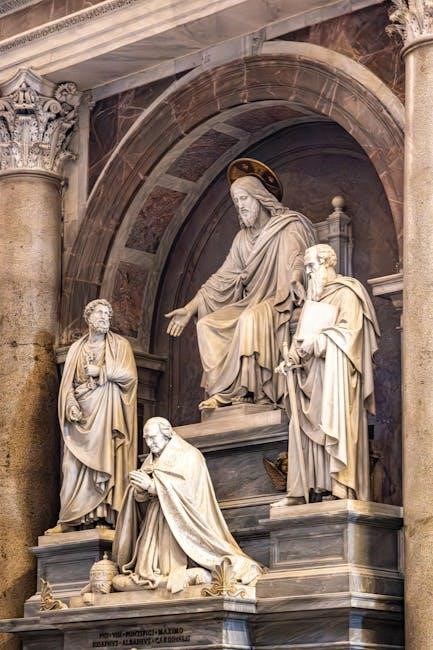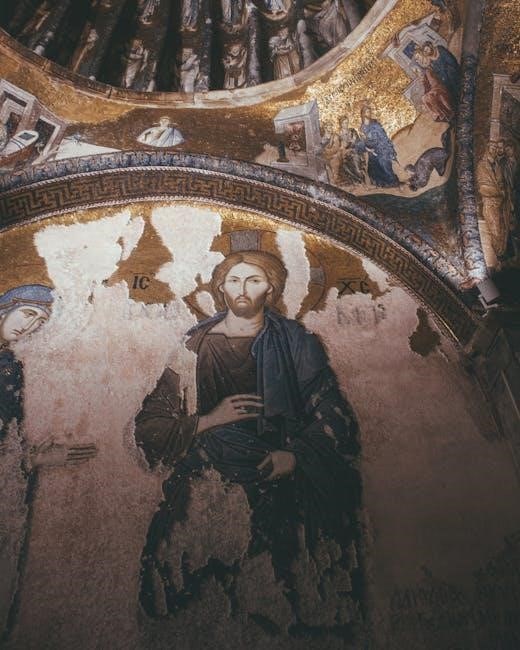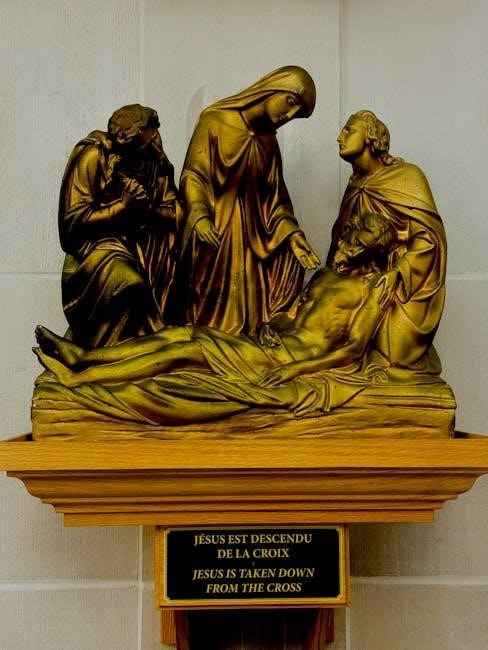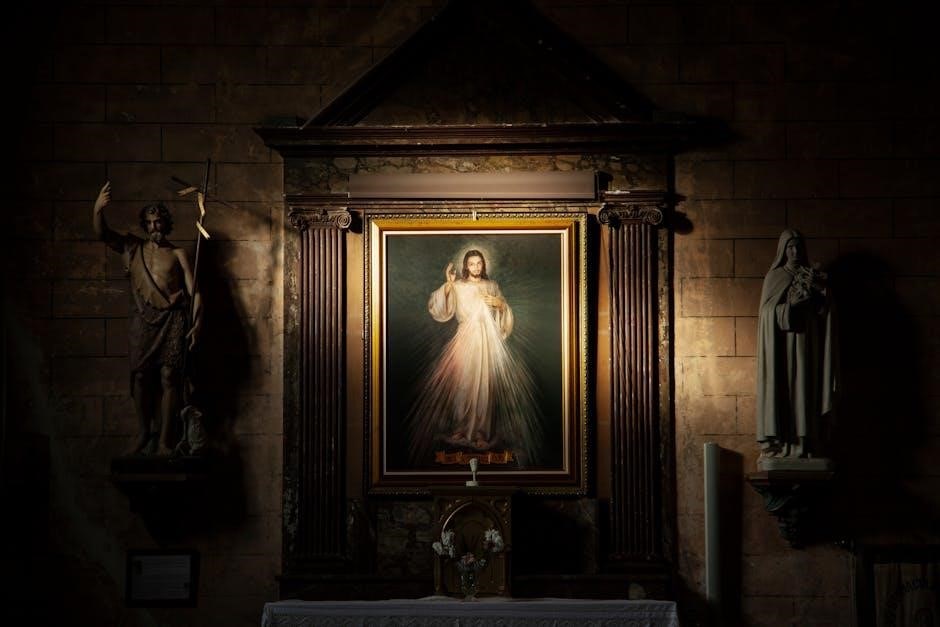This book by Kristin Kobes Du Mez explores the cultural and political transformation of white evangelicalism, linking it to ideals of militant masculinity and national identity.
Overview of the Book’s Central Argument
Kristin Kobes Du Mez’s Jesus and John Wayne explores how white evangelicalism in the U.S. transformed from a faith centered on Jesus’ teachings to a cultural movement emphasizing militant masculinity, nationalism, and political power. The book argues that this shift was deeply influenced by cultural icons like John Wayne, whose embodiment of rugged, hyper-masculine ideals aligned with evangelical values. Du Mez traces this evolution, highlighting how evangelical leaders and media reshaped the faith into a political force. She contends that this transformation has led to a fracturing of American society, as white evangelicals increasingly prioritized cultural and political identity over biblical principles, culminating in support for leaders like Donald Trump.

Author Kristin Kobes Du Mez and Her Expertise
Kristin Kobes Du Mez is a historian and professor at Calvin University, specializing in American culture, gender studies, and evangelicalism. Her expertise lies in exploring the intersections of religion, politics, and identity. With a Ph.D. in history, Du Mez brings a scholarly depth to her analysis of white evangelicalism. Her work challenges conventional narratives, offering a critical perspective on how evangelical identity has evolved. Du Mez’s research is marked by meticulous archival analysis and interdisciplinary approaches, making her a prominent voice in religious and cultural studies. Her book, Jesus and John Wayne, reflects her ability to weave historical context with contemporary issues, providing a nuanced understanding of evangelicalism’s transformation.
The Significance of the Title: Jesus and John Wayne
The title Jesus and John Wayne symbolizes the fusion of religious and cultural icons in shaping white evangelical identity. Jesus represents spiritual teachings, while John Wayne embodies a rugged, hyper-masculine ideal. This duality reflects how evangelicals merged faith with nationalist values, creating a movement centered on power and dominance. The title highlights the shift from Jesus’ message of humility to a warrior-like mentality, mirroring John Wayne’s on-screen persona. This juxtaposition underscores the book’s central argument: the corruption of faith through cultural and political influences, leading to a fractured nation. The title thus serves as a powerful metaphor for the contradictions within modern evangelicalism.

The Evolution of White Evangelicalism in the United States
White evangelicalism transformed from a spiritual faith to a cultural movement, shaped by figures like John Wayne, blending religion with nationalism and masculine ideals.
Historical Origins of Evangelical Identity
Evangelical identity in the U.S. traces its roots to the 19th century, shaped by revivalism and the Second Great Awakening. The movement emphasized personal conversion, biblical authority, and moral reform. Over time, it evolved alongside cultural shifts, incorporating ideals of masculinity and nationalism. Key figures like Billy Sunday and D. L. Moody influenced its early trajectory, blending faith with American values. The Scopes Trial in 1925 marked a turning point, as evangelicals began to define themselves against modernism. By the mid-20th century, the rise of figures like John Wayne symbolized a fusion of rugged individualism and Christian values, laying the groundwork for the militant masculinity that would later dominate the movement.
The Shift from Spiritual Faith to Cultural Movement
The transformation of evangelicalism from a spiritually focused faith to a cultural movement was driven by the integration of American nationalism and masculinity. By the late 20th century, evangelical identity became deeply intertwined with conservative politics and ideals of rugged individualism. Cultural icons like John Wayne, who embodied strength and patriotism, influenced this shift. The movement increasingly emphasized power, authority, and cultural dominance, aligning with figures like Donald Trump. This evolution led to a faith prioritizing cultural and political battles over traditional religious teachings, reshaping its role in American society and politics. The book highlights how this transformation has had lasting consequences for both the evangelical community and the nation at large.
The Role of Key Figures in Shaping Evangelical Thought
Prominent figures like Billy Graham, Jerry Falwell, and John Wayne played pivotal roles in shaping evangelical thought, blending religious ideals with cultural and political values. Billy Graham, as a revered evangelist, laid the groundwork for evangelical influence in American politics. Jerry Falwell, through the Moral Majority, mobilized evangelicals into a political force, emphasizing conservative values. John Wayne, as a cultural icon, symbolized rugged masculinity and patriotism, which resonated deeply with evangelical identity. These figures, alongside others, helped redefine evangelicalism, aligning it with nationalist and patriarchal ideals. Their influence transformed evangelicalism into a movement that prioritized cultural and political power over traditional spiritual practices, reshaping its role in American society. Their legacies continue to impact contemporary evangelical thought and activism.

The Concept of Militant Masculinity in Evangelical Culture
Militant masculinity in evangelical culture emphasizes strength, dominance, and patriotism, often intertwining faith with nationalistic ideals and a warrior-like vision of Jesus, influenced by figures like John Wayne.
Defining Militant Masculinity and Its Impact on Faith
Militant masculinity, as explored in “Jesus and John Wayne,” refers to a cultural ideal emphasizing strength, dominance, and aggression. This ideology has profoundly shaped evangelical faith, often replacing the compassionate teachings of Jesus with a more confrontational and nationalistic worldview. The book argues that this shift has led to a faith centered on power and control rather than humility and love. By examining historical and contemporary figures, Du Mez illustrates how militant masculinity has influenced evangelical politics, morality, and identity, ultimately reshaping the religious landscape in ways that align with cultural and political conservatism.
John Wayne as a Cultural Icon of Masculinity
John Wayne, an iconic actor and conservative activist, embodies the ideal of rugged, hyper-masculine American identity. His on-screen roles as a heroic cowboy and soldier symbolized strength, independence, and dominance. Wayne’s persona became a cultural touchstone for evangelical masculinity, aligning with values like leadership, authority, and patriotism. His influence extended beyond cinema, shaping political and religious narratives. Du Mez highlights how Wayne’s image, blending nationalism and faith, resonated with white evangelicals, fostering a connection between Christianity and American exceptionalism. This cultural fusion reinforced a vision of masculinity that emphasized power and control, deeply impacting evangelical identity and its political alignment. Wayne’s legacy continues to symbolize a merging of faith, nation, and gender ideals.
The Fusion of Religious and Nationalist Ideals

The fusion of religious and nationalist ideals in white evangelicalism created a powerful narrative where faith and patriotism were inseparable. This blend, as explored in Jesus and John Wayne, portrays America as a divinely chosen nation, with evangelicals as its moral guardians. The idea of a “Christian nation” was deeply rooted in historical and cultural contexts, reinforcing the belief that America’s prosperity depended on adherence to evangelical values. This fusion not only shaped political engagements but also influenced personal identities, creating a sense of divine purpose in nationalistic endeavors. The book highlights how this ideological merging has been instrumental in shaping modern evangelical thought and action, often leading to a conflation of religious duty with national loyalty.

The Role of John Wayne in Shaping Evangelical Ideology
Kristin Kobes Du Mez’s Jesus and John Wayne examines how white evangelicals merged religious faith with nationalist ideologies, creating a cultural identity centered on patriotism and moral authority. This fusion, deeply rooted in American history, positioned evangelicals as defenders of a divinely ordained nation. The book reveals how this blend of faith and nationalism influenced political engagement, fostering a sense of divine purpose in nationalistic endeavors. By aligning religious values with American exceptionalism, evangelicals crafted a narrative where their faith and national identity became inseparable, shaping their political actions and cultural influence.

John Wayne’s Image as the Embodiment of American Values
John Wayne’s cinematic persona epitomized American values such as independence, strength, and moral certainty. His roles as a rugged cowboy and patriotic soldier resonated deeply with conservative ideals, fostering a cultural identity tied to nationalism and masculinity. Wayne’s on-screen heroism and unwavering commitment to justice aligned with evangelical notions of leadership and righteousness. His real-life conservatism further cemented his status as a symbol of traditional American values. This fusion of cinematic and personal ideology made Wayne an icon, embodying a vision of masculinity and patriotism that evangelicals embraced as reflective of their faith and national pride. His influence extended beyond film, shaping cultural perceptions of heroism and moral authority.
From Cowboy to National Hero: Wayne’s Cultural Influence
John Wayne’s transformation from a Hollywood cowboy to a national hero underscored his profound cultural impact. His roles in films like The Searchers and Sands of Iwo Jima portrayed him as a steadfast, patriotic figure, aligning with evangelical ideals of strength and morality. Wayne’s persona transcended cinema, becoming a symbol of American resilience and values. His real-life conservatism and support for nationalist causes further solidified his image as a cultural icon. Evangelicals embraced him as a representation of their vision of masculinity and leadership, blending religious and nationalistic ideals. Wayne’s influence extended into politics, with figures like Pat Buchanan drawing parallels between his on-screen heroism and political leadership, cementing his legacy as a cultural and ideological touchstone.
How John Wayne’s Persona Aligned with Evangelical Values
John Wayne’s on-screen persona resonated deeply with evangelical values, emphasizing strength, moral clarity, and leadership. His characters often embodied a rugged, authoritative masculinity that mirrored evangelical ideals of manhood. Wayne’s roles as a protector and defender aligned with the evangelical notion of a righteous warrior, reinforcing the belief in a hierarchical, patriarchal order. His unwavering commitment to justice and traditional values further solidified his image as a moral authority. This alignment allowed evangelicals to see Wayne as a modern-day embodiment of biblical principles, blending religious faith with cultural nationalism. His influence helped shape an evangelical identity that prioritized strength and Moral certitude over humility and compassion.

Cultural and Political Shifts in Modern Evangelicalism
Modern evangelicalism has shifted from a spiritual movement to a cultural and political force, embracing nationalism and aligning with conservative ideologies, reshaping its role in American society.
The Rise of Christian Nationalism
Christian nationalism has emerged as a defining force in modern evangelicalism, blending religious identity with national pride. This ideology posits the United States as a divine nation, advocating for a return to “traditional” values and a strong, masculine leadership. The fusion of faith and patriotism has been instrumental in shaping political alliances, particularly in support of leaders like Donald Trump, who embody the values of strength and authority cherished by this movement. Du Mez traces how this ideology has reshaped evangelical priorities, often prioritizing cultural and political power over theological principles. This shift has deepened societal divisions, contributing to the fracturing of national unity and redefining what it means to be an evangelical in America.
Evangelical Support for Political Leaders Like Donald Trump
Evangelical support for leaders like Donald Trump underscores a significant shift in priorities, where political power often outweighs religious principles. Despite Trump’s controversial behavior, many evangelicals saw him as a defender of their values, aligning his image with a rugged, masculine ideal reminiscent of John Wayne. This support reflects a broader cultural narrative within evangelicalism, emphasizing strength, authority, and nationalism. Du Mez argues that this alliance has further entrenched partisan divides and redefined evangelical identity, prioritizing political loyalty over ethical considerations. The book highlights how this dynamic has reshaped both the religious and political landscapes, creating a legacy of moral compromise and cultural influence that continues to resonate deeply in American society.
The Intersection of Religion and Politics in Contemporary America
The intersection of religion and politics in contemporary America is deeply intertwined, particularly within evangelical communities. Du Mez’s analysis reveals how religious identity has become inseparable from political ideology, with evangelicalism increasingly aligned with nationalist and conservative agendas. This fusion has led to the rise of Christian nationalism, where religious beliefs are weaponized to justify political actions. The book highlights how this blending of faith and politics has polarized society, eroded democratic norms, and redefined moral frameworks. By examining this intersection, Du Mez sheds light on how evangelicalism has become a driving force in shaping America’s cultural and political landscape, often at the expense of traditional religious values.

The Impact of Evangelicalism on American Society
Evangelicalism profoundly shapes American society, influencing politics, culture, and identity. Its ideals have fostered polarization, reshaped public discourse, and often prioritized power over compassion, fracturing national unity.
Divisive Politics and the Fracturing of National Unity
The book highlights how white evangelicalism’s transformation into a cultural and political force has deeply divided America. By aligning with militant masculinity and nationalist ideals, evangelicals have often prioritized power over unity. This shift has led to the erosion of bipartisan cooperation and fostered polarization. The fusion of religious identity with political ideology has created an “us versus them” mentality, alienating those who do not conform to these ideals. The rise of figures like Donald Trump, who embodies the rugged, authoritarian masculinity celebrated by many evangelicals, further exemplifies this fracture. The result is a nation increasingly fragmented along cultural and political lines, with evangelicalism at the forefront of this divide.
Changes in Moral and Ethical Frameworks
Kristin Kobes Du Mez’s work reveals a significant shift in evangelical moral priorities, from a focus on personal piety to a culture of power and dominance. The embrace of militant masculinity has reshaped ethical frameworks, often justifying actions that align with nationalistic and authoritarian values. Traditional Christian teachings on humility and compassion have been overshadowed by a rhetoric of strength and control; This transformation has led to moral contradictions, where support for leaders like Donald Trump is framed as a defense of faith, despite behaviors that contradict historical evangelical moral standards. The book illustrates how these changes have not only altered internal religious dynamics but also influenced broader societal ethics and political discourse.
The Role of Media and Consumer Culture in Shaping Beliefs
Media and consumer culture significantly influenced the merger of evangelical identity with American nationalism. Figures like John Wayne, through films and public persona, symbolized rugged masculinity and patriotism, shaping ideals that resonated deeply with evangelicals. The rise of Christian media, including books, films, and music, further entrenched these values, creating a cultural ecosystem where faith and nationalism intertwined seamlessly. Consumer culture played a pivotal role in normalizing these ideas, as evangelical leaders and institutions marketed a vision of faith that aligned with political conservatism and militarism. This cultural convergence transformed evangelicalism into a movement deeply entangled with American identity, reshaping beliefs and practices in ways that continue to impact society today.

Reception and Criticism of “Jesus and John Wayne”
The book received both acclaim and criticism for its insightful analysis of evangelicalism’s transformation, sparking debates on faith, masculinity, and nationalism’s role in modern America.
Academic and Public Response to the Book
Kristin Kobes Du Mez’s Jesus and John Wayne has sparked significant academic and public debate. Scholars praise its meticulous research and insightful analysis of evangelicalism’s cultural transformation, while some critics argue its broad conclusions risk overgeneralization. The book has been widely discussed in both religious and political circles, with many highlighting its relevance to understanding the intersection of faith and nationalism in modern America. Its exploration of how evangelical identity became entangled with militaristic masculinity has resonated with readers, making it a bestseller and a focal point for conversations about religion’s role in shaping political ideologies and cultural values.
Controversies and Debates Sparked by the Book
Jesus and John Wayne has ignited intense controversy, particularly among evangelical circles. Critics argue that the book unfairly caricatures white evangelicals by linking their faith to toxic masculinity and political extremism. Some scholars, like Victor Davis Hanson, have criticized Du Mez for her portrayal of evangelical leaders and their influence on political movements. Conversely, supporters applaud the book for exposing the ways in which evangelicalism has been co-opted by nationalist and patriarchal agendas. The debates highlight the polarized reactions to the book, with some viewing it as a necessary critique and others as an unfair attack on their faith community and cultural identity.
The Book’s Contribution to Religious and Cultural Studies
Jesus and John Wayne offers a groundbreaking analysis of the intersection of religion, gender, and politics in America. By tracing the evolution of white evangelicalism, Du Mez provides a compelling narrative that challenges traditional interpretations of evangelical identity. The book’s meticulous research and interdisciplinary approach have made it a significant contribution to both religious and cultural studies. It bridges the gap between academic and public discourse, sparking vital conversations about the role of faith in shaping societal values. Du Mez’s work has been praised for its originality and depth, making it a pivotal text for understanding the complexities of modern evangelicalism and its broader cultural implications.
The book concludes by reflecting on the intertwining of faith and cultural identity, urging evangelicals to reconsider their values and societal impact for a unified future.
Reiterating the Book’s Key Findings
Kristin Kobes Du Mez’s Jesus and John Wayne examines how white evangelicalism shifted from a faith centered on Jesus’ teachings to a cultural movement emphasizing militant masculinity and nationalism. The book argues that this transformation was influenced by figures like John Wayne, whose rugged, hyper-masculine persona became an icon of American values. Du Mez traces how evangelical leaders and media reinforced this cultural identity, aligning it with political ideologies. The book highlights how this fusion of religion and nationalism led to evangelical support for leaders like Donald Trump, despite contradictions with traditional Christian ethics. Ultimately, the text underscores the profound consequences of this shift for American society, politics, and the fracturing of national unity.
Implications for the Future of Evangelicalism
Kristin Kobes Du Mez’s analysis suggests that the future of evangelicalism hinges on its ability to reckon with its cultural and political entanglements. The book highlights the need for evangelicals to reflect on how their faith has been shaped by nationalist and masculine ideals, potentially leading to a redefinition of their identity. As American society becomes more polarized, evangelicalism’s alignment with political power may further divide communities. The text implies that the movement’s sustainability depends on its willingness to disentangle itself from cultural ideologies and return to its spiritual roots. This reckoning could either revitalize the faith or deepen its fracture, making the book’s findings a critical call to action for the evangelical community’s future trajectory.
A Call for Reflection and Reckoning in the Evangelical Community
Kristin Kobes Du Mez’s work serves as a clarion call for the evangelical community to engage in introspection and accountability. The book underscores the necessity for evangelicals to critically examine how their faith has been intertwined with cultural and political ideologies, such as militant masculinity and nationalism. By tracing the historical and contemporary influences that have shaped evangelical identity, Du Mez encourages believers to confront the consequences of these alignments. The text emphasizes the urgent need for a collective reckoning, urging evangelicals to question how their values and practices align with the teachings of Jesus. This reflective process could lead to a more authentic and compassionate expression of faith, one that prioritizes spiritual integrity over cultural and political agendas.

Leave a Reply
You must be logged in to post a comment.